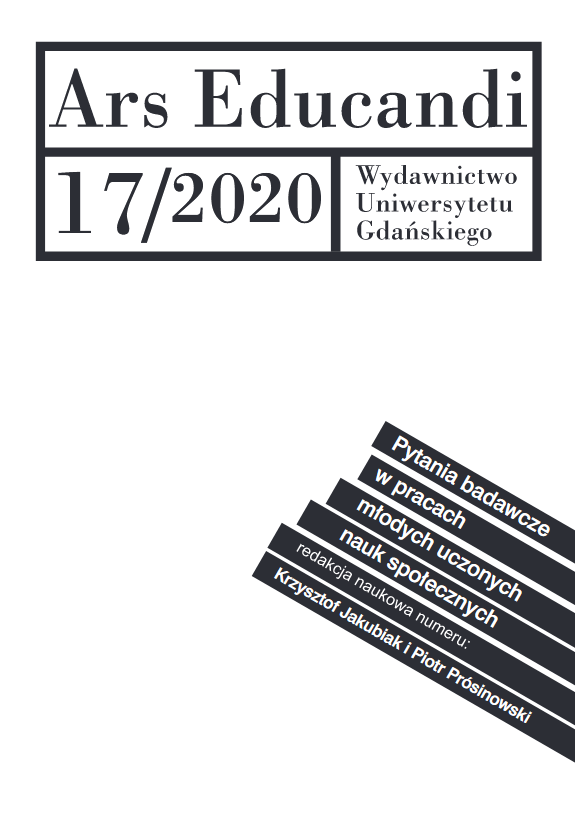Tripartite school conflicts and non-consensual democracy. An attempt of autoethnographic analysis
DOI:
https://doi.org/10.26881/ae.2020.17.08Keywords:
conflict, parents, subjectivity, students, non-consensual democracyAbstract
The article presents an analysis of four school conflicts on the parent-teacher line. I am trying to prove that the teacher-parental conflict is always actively involved with the student, with his paidocentric position in the family, subjectivity and authority as the third party in the process of democratic dialogue (B. Śliwerski 2007). I use the analytical autoethnography method, the most appropriate from my point of view, based on a subjective approach, the analysis of feelings and reactions, self-observation, first-person narrative, analysis of the researcher's notes and own narratives, forcing the full participant in the studied environment (complete member researcher), analytical reflexivity, data transcending. (C. Ellis 2004, L. Anderson 2014). The school in my article is perceived as a place of conflict which is an unobvious expression of democratic dissent and a difficult way of achieving commonality, which is a condition of democracy. The conflict is an indispensable social element and the basis of relations of subjective character, characteristic of democratic forms of social life (Rancière 1999, Coser 2009, Beaurdieu 1990). Confronting this with knowledge developed around the idea of non-consensual democracy, which is based on discord (dissensus) after the reading (J.Rancière 1999, L. A. Coser 2009, L.Koczanowicz 2015, K. Wajszczyk 2015, M. Mendel 2002) I assume that not only the occurrence of conflicts is a problem, but the lack of orientation on the positive meaning of the situation of disagreement and attitudes related to attaining it and ensuring equality for others in the practice of dialoging participants in school life.
Downloads
References
1. Anderson, L. (2014). Autoetnografia analityczna. Przegląd Socjologii Jakościowej 10(3), 144-167.
2. Bourdieu, P., Passeron, J.-C. (1990), Reprodukacja. Elementy teorii systemu nauczania. Transl. E. Neyman, Warsaw, Poland: Państwowe Wydawnictwo Naukowe.
3. Coser, L. A. (2009). Funkcje konfliktu społecznego. Trans. S. Burdziej. Cracow, Poland: Zakład wydawniczy "Nomos".
4. Ellis, C. (2004). The Ethnographic I : A Methodological Novel about Autoethnography. Walnut Creek, California: Altamira Press.
5. Kacperczyk, A. (2014) Autoetnografia – technika, metoda, nowy paradygmat? : o metodologicznym statusie autoetnografii. Przegląd Socjologii Jakościowej 10(3), 32-75.
6. Koczanowicz, L. (2015), Polityka dialogu. Demokracja niekonsensualna i wspólnota krytyczna. Trans. K. Liszka. Warszawa, Poland: Wydawnictwo Naukowe PWN.
7. Mendel, M. (2002). Partnerstwo rodziny, szkoły i gminy. Toruń, Poland: Wydawnictwo Adam Marszałek.
8. Rancière, J. (1999). Dis-agrement. Politics and Philosophy. Trans. by J. Rose, University of Minessota Press, Minneapollis-London.
9. Śliwerski, B.(2007). Pedagogika Dziecka. Studium Pajdocentryzmu. Gdańsk, Poland: Gdańskie Wydawnictwo Psychologiczne.
10. Wajszczyk, K. (2015). Konflikt w szkole. Studium etnograficzne. Gdańsk, Poland: Wydawnictwo Uniwersytetu Gdańskiego.
11. Włodarczyk, R. (2017) Demokracja, utopia, wychowanie. Utopia a edukacja, 3. Wrocław, Poland: Instytut Pedagogiki Uniwersytetu Wrocławskiego.

 Academic Scientific Journals
Academic Scientific Journals




